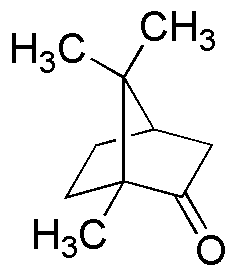(+)-Camphor is widely utilized in research focused on various practical applications across multiple industries.
- Pharmaceuticals: It is commonly used in topical analgesics and ointments due to its ability to provide pain relief and reduce inflammation. For example, camphor is a key ingredient in products like muscle rubs that help soothe sore muscles.
- Cosmetics: The compound serves as a fragrance and cooling agent in many cosmetic products, enhancing sensory appeal. Its natural scent makes it a popular choice in perfumes and lotions.
- Food Industry: Camphor is used as a flavoring agent in certain food products, particularly in Asian cuisines. Its unique taste can enhance the flavor profile of dishes, making it a valuable ingredient in culinary applications.
- Traditional Medicine: In herbal medicine, camphor is utilized for its antiseptic and anti-inflammatory properties. It is often found in remedies for respiratory conditions, helping to relieve cough and congestion.
- Industrial Applications: The chemical is employed in the production of plastics and as a solvent in various chemical processes. Its effectiveness in these roles contributes to improved product performance and stability.
General Information
Properties
Safety and Regulations
Applications
(+)-Camphor is widely utilized in research focused on various practical applications across multiple industries.
- Pharmaceuticals: It is commonly used in topical analgesics and ointments due to its ability to provide pain relief and reduce inflammation. For example, camphor is a key ingredient in products like muscle rubs that help soothe sore muscles.
- Cosmetics: The compound serves as a fragrance and cooling agent in many cosmetic products, enhancing sensory appeal. Its natural scent makes it a popular choice in perfumes and lotions.
- Food Industry: Camphor is used as a flavoring agent in certain food products, particularly in Asian cuisines. Its unique taste can enhance the flavor profile of dishes, making it a valuable ingredient in culinary applications.
- Traditional Medicine: In herbal medicine, camphor is utilized for its antiseptic and anti-inflammatory properties. It is often found in remedies for respiratory conditions, helping to relieve cough and congestion.
- Industrial Applications: The chemical is employed in the production of plastics and as a solvent in various chemical processes. Its effectiveness in these roles contributes to improved product performance and stability.
Documents
Safety Data Sheets (SDS)
The SDS provides comprehensive safety information on handling, storage, and disposal of the product.
Product Specification (PS)
The PS provides a comprehensive breakdown of the product’s properties, including chemical composition, physical state, purity, and storage requirements. It also details acceptable quality ranges and the product's intended applications.
Certificates of Analysis (COA)
Search for Certificates of Analysis (COA) by entering the products Lot Number. Lot and Batch Numbers can be found on a product’s label following the words ‘Lot’ or ‘Batch’.
*Catalog Number
*Lot Number
Certificates Of Origin (COO)
This COO confirms the country where the product was manufactured, and also details the materials and components used in it and whether it is derived from natural, synthetic, or other specific sources. This certificate may be required for customs, trade, and regulatory compliance.
*Catalog Number
*Lot Number
Safety Data Sheets (SDS)
The SDS provides comprehensive safety information on handling, storage, and disposal of the product.
DownloadProduct Specification (PS)
The PS provides a comprehensive breakdown of the product’s properties, including chemical composition, physical state, purity, and storage requirements. It also details acceptable quality ranges and the product's intended applications.
DownloadCertificates of Analysis (COA)
Search for Certificates of Analysis (COA) by entering the products Lot Number. Lot and Batch Numbers can be found on a product’s label following the words ‘Lot’ or ‘Batch’.
*Catalog Number
*Lot Number
Certificates Of Origin (COO)
This COO confirms the country where the product was manufactured, and also details the materials and components used in it and whether it is derived from natural, synthetic, or other specific sources. This certificate may be required for customs, trade, and regulatory compliance.


